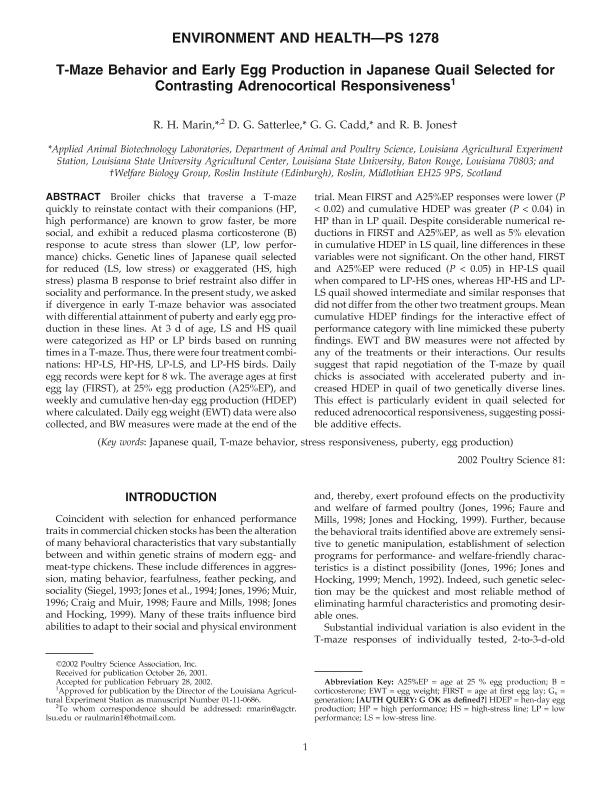Mostrar el registro sencillo del ítem
dc.contributor.author
Marin, Raul Hector

dc.contributor.author
Satterlee, D. G.
dc.contributor.author
Cadd, G. G.
dc.contributor.author
Jones, R. B.
dc.date.available
2018-12-19T18:21:10Z
dc.date.issued
2002-06-01
dc.identifier.citation
Marin, Raul Hector; Satterlee, D. G.; Cadd, G. G.; Jones, R. B.; T-maze behavior and early egg production in Japanese quail selected for contrasting adrenocortical responsiveness; Poultry Science Association; Poultry Science; 81; 7; 1-6-2002; 981-986
dc.identifier.issn
0032-5791
dc.identifier.uri
http://hdl.handle.net/11336/66773
dc.description.abstract
Broiler chicks that traverse a T-maze quickly to reinstate contact with their companions (HP, high performance) are known to grow faster, be more social, and exhibit a reduced plasma corticosterone (B) response to acute stress than slower (LP, low performance) chicks. Genetic lines of Japanese quail selected for reduced (LS, low stress) or exaggerated (HS, high stress) plasma B response to brief restraint also differ in sociality and performance. In the present study, we asked if divergence in early T-maze behavior was associated with differential attainment of puberty and early egg production in these lines. At 3 d of age, LS and HS quail were categorized as HP or LP birds based on running times in a T-maze. Thus, there were four treatment combinations: HP-LS, HP-HS, LP-LS, and LP-HS birds. Daily egg records were kept for 8 wk. The average ages at first egg lay (FIRST), at 25% egg production (A25%EP), and weekly and cumulative hen-day egg production (HDEP) where calculated. Daily egg weight (EWT) data were also collected, and BW measures were made at the end of the trial. Mean FIRST and A25%EP responses were lower (P < 0.02) and cumulative HDEP was greater (P < 0.04) in HP than in LP quail. Despite considerable numerical reductions in FIRST and A25%EP, as well as 5% elevation in cumulative HDEP in LS quail, line differences in these variables were not significant. On the other hand, FIRST and A25%EP were reduced (P < 0.05) in HP-LS quail when compared to LP-HS ones, whereas HP-HS and LP-LS quail showed intermediate and similar responses that did not differ from the other two treatment groups. Mean cumulative HDEP findings for the interactive effect of performance category with line mimicked these puberty findings. EWI and BW measures were not affected by any of the treatments or their interactions. Our results suggest that rapid negotiation of the T-maze by quail chicks is associated with accelerated puberty and increased HDEP in quail of two genetically diverse lines. This effect is particularly evident in quail selected for reduced adrenocortical responsiveness, suggesting possible additive effects.
dc.format
application/pdf
dc.language.iso
eng
dc.publisher
Poultry Science Association

dc.rights
info:eu-repo/semantics/openAccess
dc.rights.uri
https://creativecommons.org/licenses/by-nc-sa/2.5/ar/
dc.subject
Egg Production
dc.subject
Japanese Quail
dc.subject
Puberty
dc.subject
Stress Responsiveness
dc.subject
T-Maze Behavior
dc.subject.classification
Otras Ciencias Biológicas

dc.subject.classification
Ciencias Biológicas

dc.subject.classification
CIENCIAS NATURALES Y EXACTAS

dc.title
T-maze behavior and early egg production in Japanese quail selected for contrasting adrenocortical responsiveness
dc.type
info:eu-repo/semantics/article
dc.type
info:ar-repo/semantics/artículo
dc.type
info:eu-repo/semantics/publishedVersion
dc.date.updated
2018-11-12T13:45:12Z
dc.identifier.eissn
1525-3171
dc.journal.volume
81
dc.journal.number
7
dc.journal.pagination
981-986
dc.journal.pais
Estados Unidos

dc.journal.ciudad
Oxford
dc.description.fil
Fil: Marin, Raul Hector. Consejo Nacional de Investigaciones Científicas y Técnicas; Argentina. State University of Louisiana; Estados Unidos
dc.description.fil
Fil: Satterlee, D. G.. State University of Louisiana; Estados Unidos
dc.description.fil
Fil: Cadd, G. G.. State University of Louisiana; Estados Unidos
dc.description.fil
Fil: Jones, R. B.. Roslin Institute; Reino Unido
dc.journal.title
Poultry Science

dc.relation.alternativeid
info:eu-repo/semantics/altIdentifier/url/https://academic.oup.com/ps/article/81/7/981/1557711
dc.relation.alternativeid
info:eu-repo/semantics/altIdentifier/doi/https://dx.doi.org/10.1093/ps/81.7.981
Archivos asociados
